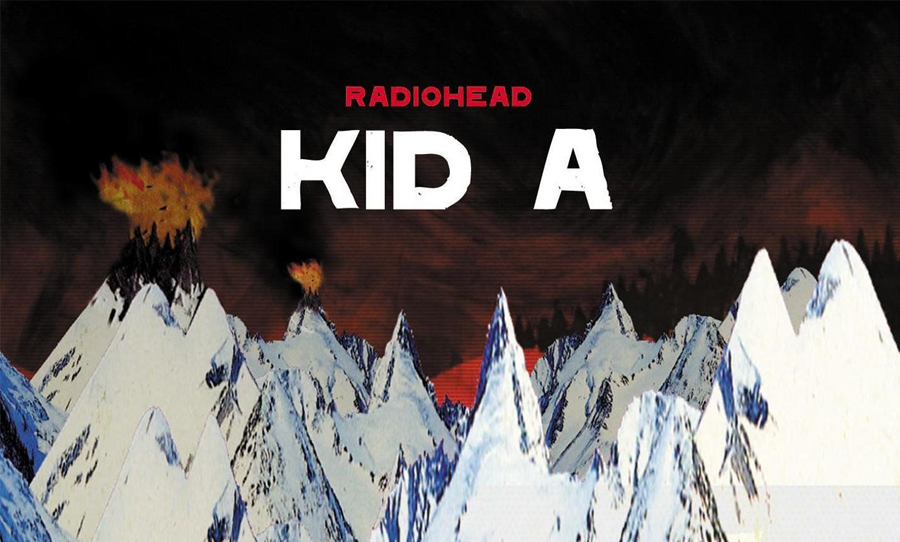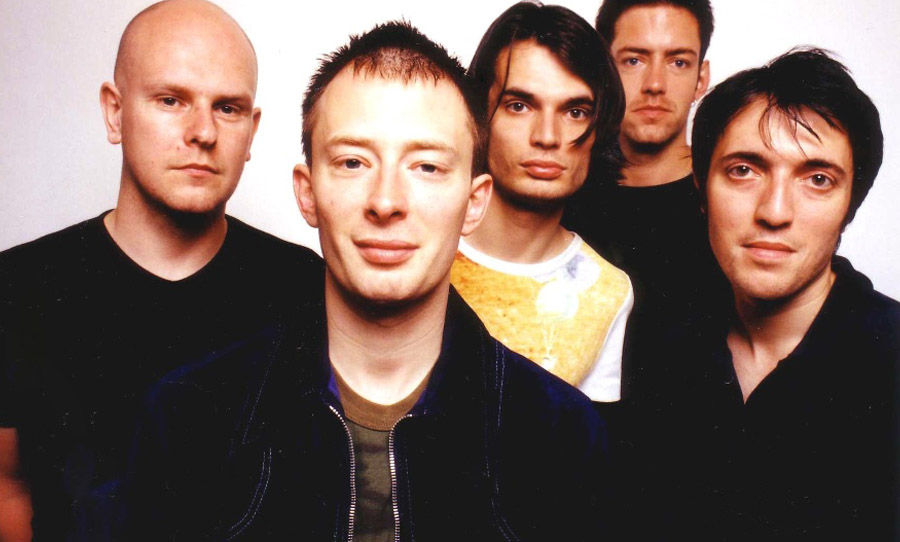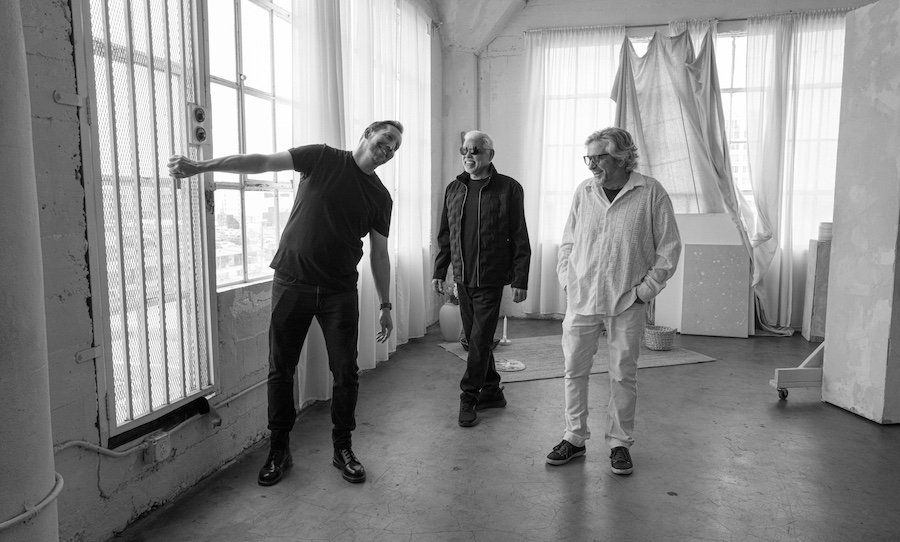KID A saw Radiohead take a drastic left turn from their alt-rock mandate. Although received with confusion from fans, 20 years later, the record has made claim as one of the most important albums of all time.
20 years ago, one of the most controversial and polarising albums of the 21st century was released to a mixed response of awe and confusion. Nonetheless, this record would leave a legacy as one of the most important albums of the new millennium, going on to define the band known as Radiohead.
Radiohead’s KID A saw a radical left turn for a group that were on the doorstep of becoming the greatest rock band in the world. However, Radiohead were burnt out and in need of a drastic transformation, not only for their sanity but for their longevity.

I’m not here, this isn’t happening
The release of KID A came three years after OK Computer: an album that had propelled the five friends from Abingdon School into rock superstardom. OK Computer came at the decline of the Brit-Pop era and influenced an array of newer British acts who aimed to adopt the complex, atmospheric stylings that had been intertwined throughout the album.
This record not only saw Radiohead propelled into the mainstream but bestowed the responsibility and pressure of leading the next generation of British alternative rock, carrying the flag on from bands such as Oasis and Blur.
Radiohead’s commercial high point lead to an 11-month world tour, an experience that resulted in extreme burnout and a near-mental breakdown for lead singer Thom Yorke, as the band became disillusioned with their own sound. They needed a break from the road but, more importantly, they needed to reinvent themselves. With no desire to perform intricate and detailed songs, Thom Yorke and co became cynical of their own work and withdrawn from the idea of producing another rock album.
Yorke, himself, struggled with depression during this time and grew catatonic, paralysed by the sound of his own voice and unable to commit to fresh songwriting. Instead, he immersed himself in electronic works from the likes of LFO and Aphex Twin, rekindling his love of techno music from university.
When it came time to start writing the new album, the band struggled with self-doubt and writer’s block. Reconvening in Paris in early 1999, before moving to a studio in Copenhagen just a month later, both attempts at putting words into music were left unresolved. Yorke, who had more often than not provided the words and chords for each Radiohead release, struggled to inspire his bandmates with, what seemed to be, unfinished ideas.
In April, the band attempted to restart their creative process. After being plagued by false starts, they moved into a quaint, 17th-century mansion, known as Batsford Park. Yorke had been working on his own for the most part, venturing into unknown territory with piano and synthesisers: tools he felt that he could program without having to pour himself emotionally into the music.
The initial sessions evoked the same amount of success as their previous attempts to put together an album. Yorke had assembled a list of 60 titles that could potentially be used for the new record, some fully formed songs and others that were mere words thrown together and chucked into a hat. Despite the precarious nature of their task, there were certainly moments of inspiration, with Yorke engineering the track that would become the foundation of Radiohead’s post-OK Computer sound.

Upon the completion of the album’s opening track Everything In Its Right Place, with its flurry of electronic piano and distorted vocals, it became obvious to the band that they had turned a corner. The fragmentation in Yorke’s voice heralded the existential horror that Radiohead had been suffering over the last few years, with this opening track capturing the essence of a band attempting to rediscover themselves.
Although initially reluctant, Radiohead members began to subscribe to Yorke’s idea of creating an album divergent to their sonic past, spending a number of weeks working with electronic tools and enlisting an eight-piece horn section for The National Anthem.
Where OK Computer had been meticulously held together through its lyricism, the song-list from KID A often came from lyrical ideas that Yorke had written on a piece of paper and pulled out in random in order. KID A was much more than the meaning behind the lyrics, focusing on the atmosphere created by the music.
Everyone is so near
When recording wrapped up in April 2000, Radiohead found themselves in the dawning age of the internet, providing the perfect opportunity for them to capitalise on the fresh, new technology, just as they had in their music.
Despite their fourth LP standing as one of the most anticipated rock albums in history, the band conducted very few interviews, photoshoots, and stayed clear of any traditional promotion following the release announcement. In an attempt to avoid the expectation of publicity and to present the record as a cohesive unit, the band also decided to not release any singles.
Instead, they embraced the emerging digital world, becoming one of the first major bands to turn to the great online unknown for promotion. Their record label, Capitol, launched an online marketing campaign, distributing short films tracked to the album on online channels. This was particularly innovative at a time when marketing was reliant on broadcast shows, such as MTV, and radio to build interest in the upcoming music.
The album was available for pre-order and slated for online streaming through Amazon, and MTV.com. However, just three weeks prior to the October release, KID A was leaked on the online service Napster. Radiohead and their label were relatively nonchalant about the leak, suggesting that the band weren’t so aloof with their audience and how they experienced music. A mutual respect between the band and their fans grew from this, as they planted the seeds for a more accessible era of music consumption.
Let me hear both sides
Despite zero airplay, KID A debuted at number one on both the UK and US charts in October 2000. Nonetheless, Radiohead’s attempt to shed the skin of OK Computer and transcend the label of alternative rock was initially deemed a commercial suicide.
Critics were left dumbfounded by the minimalist texturing and more diverse electronic instrumentation of KID A, arguing that this was an awkward move away from the assertive live rock of their last album.
The confusion fabricated by this change reflected in many reviews. “Kid A is intriguing, eccentric, a grower, but by Radiohead’s standards, it can’t help but disappoint,” Jim Irvine of Mojo wrote. Meanwhile, Melody Maker writer Mark Beaumont went as far as calling KID A a “self-congratulatory, look-ma-I-can-suck-my-own-cock whiny old rubbish.”
At the time, many critics couldn’t fathom the minimalist nature of the LP and, while not all reviews were outlandishly negative, there seemed to be a zeitgeist of disappointment. NME called out the band for being, “scared to commit itself emotionally”, while Alexis Petridis of The Guardian described the album as “the noise made by a band trying so hard to make a ‘difficult’ album that they felt it beneath them to write any songs.”
This reaction, although confusing, was exactly what Radiohead had expected. They had rejected the alt-rock confines attributed to them after Creep and OK Computer, forcing critics and fans to rewrite everything they thought they knew about the band.
Despite many believing that the album had failed to follow on from the success of OK Computer, one 10/10 review from Pitchfork not only offered a contrasting point of view, but saw the publication, itself, move music criticism into the digital space.
Pitchfork’s perfect score of KID A, coupled with the style in which Brent DiCrescenzo eloquently described his immersion with the album, saw the publication stand out from the others. Pitchfork built towards the review on their website and even reached out to Radiohead fan websites to let readers know about the upcoming perfect score. Just as Radiohead looked to utilise the technology at their disposal, Pitchfork’s perfect review birthed the story of how music criticism would move into the online world.
What would follow was Rolling Stone awarding KID A four out of five stars and Spin awarding the album a 9/10 rating.
Ultimately, these reviews ended up on the right side of history.
You’re living in a fantasy world
In the following years, KID A, with its atmospheric synths, self-doubt, and oblique output, saw itself honoured with critical acclaim. Radiohead’s attempt to not allow the rock world to cage them into a single category has been compared to Bob Dylan’s infamous change in style, seeing a band who were on the doorstep of break up transform into the music legends we know today.
Thom Yorke, who struggled more than anyone else with this direction, told The Guardian back in 2000, “Once we finished the record, I started being easier on myself, because I understood a little bit better where I was supposed to be.”
After struggling with the pressure and autonomy of touring OK Computer, the band had created an album that they were excited to perform. Radiohead’s new outlook would breathe life into their next albums, Amnesiac, Hail To The Thief, and In Rainbows, all featuring stylings encapsulated by their predecessor.
It was well documented at the time how polarising KID A was for the industry, fans, and the rock scene. However, today, KID A is met with nostalgic hindsight, heralded as a game-changer for the rock genre.
The opening five notes of Everything In Its Right Place are now viewed as a change of the times, with Thom Yorke singing of his own confusing existence. The vocal distortions applied in KID A stand an important metaphor for the emotional journey designed to be experienced by its audience, while songs such as The National Anthem can still move crowds to communal joy.
In retrospect, the album is viewed as an insight into Radiohead’s reformation, destroying themselves completely in order to build themselves up brick by brick. The anxiety of existential crisis in How To Disappear Completely captured the millennial angst of the time, while Idoteque sees Radiohead completely depart from their earliest sound.
Retrospectively, the legacy KID A leaves is astounding, viewed as a cultural cornerstone for the early 2000s and a premonition of the disconnected decade to come. Ten years on from its release, Pitchfork, the Times, and Rolling Stone awarded the album the number one spot as the Greatest Album of the 2000s. Furthermore, Rolling Stone ranked it at number 20 in its list of the 500 Greatest Albums of All Time in their 2020 update, moving up more than 400 places from its original position in 2003.
Radiohead’s use of the dawning internet for promotion was revolutionary at the time and has been credited with paving the way for how music is experienced today. OK Computer saw Radiohead soar to the peak of their powers, but ultimately left them empty and unfulfilled. Their next album was predicted to propel them to title as the greatest band of their time. However, the ambitious nature of KID A, instead, left a legacy as being one of the most foremost albums of the 21st century.
In 2019, Radiohead were inducted into the Rock & Roll Hall Of Fame and yet, it was an album that challenged the rock status quo that propelled them there. Radiohead wouldn’t be who they are today if it wasn’t for KID A.
Listen to the album below:



